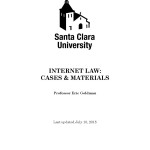
Federal Trade Secret Bill Re-Introduced–And It’s Still Troublesome (Guest Blog Post)
You may recall my prior coverage of Congress’ efforts to enact a new federal trade secret cause of action. The Defend Trade Secret Act has been reintroduced to Congress and it deserves your attention. If enacted, it would be among the most…

What’s Worse Than Cleaning Up A Meth Lab? A Trademark Injunction Against Using “Meth Lab Cleanup” In Metatags
Opinions like this make me really crank-y. The litigants compete in the meth lab cleanup business. The plaintiff has registered trademarks for “Meth Lab Cleanup LLC.” Right away, we already know that weaponizing highly descriptive terms like that can cause…

Two 512(f) Rulings Where The Litigants Dispute Copyright Ownership
When is it appropriate to send copyright takedown notices in the midst of an underlying battle over who owns the copyright? This issue is coming up with increasing frequency, as takedown notices can create more battlefronts for the parties to…

Is Amazon Liable For IP Violations By Its Marketplace Vendors? (Forbes Cross-Post)
Animal-shaped pillows are cute and fluffy, except when they spur litigation. Recently, the Milo & Gabby brand sued Amazon for IP infringement because merchants allegedly sold knockoffs of its “Cozy Companion Pillowcases.” Amazon has successfully avoided IP liability for its…

If You’re Going To Incorporate Online T&Cs Into a Printed Contract, Do It Right–Holdbrook v. PCS
The plaintiff runs a pediatric dentistry. It retained defendant PCS to provide cloud services. The dentistry alleges that PCS subsequently locked it out of the cloud services improperly. The dentistry sued PCS for the lockout, and PCS sought to arbitrate…

Are You Smarter Than a 2L? (Internet Law Edition)
I created a small number of multiple-choice review questions for the 2015 edition of my Internet Law casebook. Over time, I plan to add many more questions, so this is just a tentative start. Still, for your fun and amusement,…

2015 Internet Law Casebook Now Available
I have posted the 2015 edition of my casebook, Internet Law: Cases and Materials. It’s available in three formats: PDF ($8), Kindle ($9.99) and hard copy ($20 + shipping/tax, and it includes a free PDF on request). The $8 PDF…

Sending Emails Isn’t Workplace Stalking–People v. Marian
Do you remember the 1990s debates over whether cyberspace is a “place,” and why that might matter? Yeah, we’re back to that. This case involves N.Y. Penal Law § 120.45(3), which occurs when a person (emphasis added): intentionally, and for…

Clickthrough Agreement Upheld–Whitt v. Prosper
I’m way behind in blogging clickthrough agreement cases, but I’m prioritizing this opinion because of its simplicity. Whitt, who is deaf, sought a loan via a “peer-to-peer lending service” called Prosper. To confirm his identity, Whitt needed to make a…

Troubling Trademark Ruling Over Amazon’s Internal Search Results–MTM v. Amazon (Forbes Cross-Post)
When a consumer asks a retailer for a product the retailer doesn’t carry, how should the retailer respond? A recent federal appellate court opinion suggested that Amazon.com gave the wrong answers to consumers searching for a watch brand that it…
